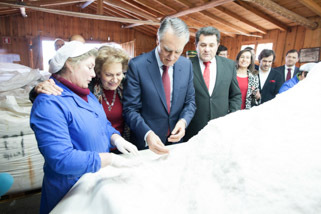

The President of the Republic addressed a message to Parliament with respect to the return of the decree which introduces changes to Parliamentary Electoral Legislation.
Following is the text of the message of the President of the Republic:
“Mister Speaker
Excellency,
Having received, to be enacted as law, Parliamentary Decree No. 261/X, which alters for the fifteenth time Law No. 14/79, dated 16 May (Parliamentary Electoral Law), I have decided, in accordance of article no. 136 of the Constitution of the Republic, not to enact that organic law, based upon the following considerations:
1 – The strengthening of the bonds linking the Portuguese residing abroad with their Country and the contribution towards an increase in the civic or political participation of all the citizens are national imperatives.
2 – Such imperative circumstances relate to commitments which I have long undertaken with the Portuguese of doing everything in my power to guarantee greater proximity between Portugal and its communities spread throughout the world.
3 – The obligation of citizens residing abroad to personally exercise the right to vote, deriving from the abrogation of Decree-Law No. 95-C/76, dated 30 January, will result in absenteeism, as stated in due time, by the spokesman of the National Electoral Commission, an independent authority, and has been proven by studies made by internationally referenced institutions. There is, moreover, an extremely revealing factor: the participation of voters resident abroad is significantly higher, approximately double, in effect, in Parliamentary elections, where absentee balloting is permitted, than in the elections for the Presidency of the Republic, where personal voting is obligatory.
4 – In this context, an alteration such as is now proposed could only be acceptable if, by any chance, one of the two following circumstances would occur: that, after more than thirty years in force, such a practice had given rise to systemic electoral fraud or wrongdoing; or that a conclusion had been reached that such a practice, in force since 1976, is contrary to constitutional principles.
5 – The experience of more than thirty years does not demonstrate the occurrence of either electoral fraud or wrongdoing in the exercise of absentee balloting. On the contrary, the results obtained in emigrant constituencies have never been queried by any of the political parties.
6 – On the other hand, the Constitution does not compel personal appearance when voting for Parliament, thus following the practice of several developed countries which clearly distinguish the principles of personality and of presence when voting and accept absentee balloting, such as Germany, Austria, Canada, Denmark, Ireland, Norway, Luxembourg, Spain, Italy, the United Kingdom, Switzerland, and Belgium. Sweden, Australia, the Netherlands or New Zealand.
7 – No real motives can thus be gleamed for the change which is now intended, which, not by any accident, was firmly opposed by the Standing Committee of the Portuguese Communities, which I recently received in audience and later, in a letter addressed to me, asserted that «the requirement for personal voting (...) will still further remove the civic and political participation of the Portuguese community, making the wish for participation of our countrymen even more difficult».
8 – Likewise, the large number of appeals received from organizations representing the Diaspora and by individual citizens have called our attention to the difficulties inherent to the need of exercising a personal vote, obliging thousands of people to travel hundreds or thousands of kilometres to exercise such fundamental rights which are, also in this case, a demonstration of civic, political and affective bonds with Portugal.
9 – It should also be taken into account that the decree in question appears at a time when several measures concerning emigrant communities have brought about deep controversy, especially the restructuring of the consular network and the reduction in the carriage paid for the remittance of periodical publications, thus creating a negative feeling of removal of the Portuguese residing abroad in relation to their Country.
10 – Taking into account the size of our consular network, we are forced to conclude that it is unable to fully satisfy the needs of our communities abroad. It was thus not certainly by accident that the Government Programme, in its chapter with respect to the «Valuation of the Portuguese Communities», refers to recourse to «information and communication technologies in order to minimize the physical displacement of users to consular offices». Equally, it cannot be by chance that the new decree foresees that voting can be exercised in locations other than consular posts or sections, but also in official facilities made available by the authorities of the host countries or in the headquarters of Portuguese associative organizations.
11 – It happens, however, that official information is being received stating that in several countries – to be precise, in sizeable countries with numerous Portuguese communities -, the respective authorities do not permit the exercise of voting rights outside Portuguese official facilities. With respect to other countries, there is no information guaranteeing an effective, adequate and timely number of ballot stations when the date of the electoral act becomes known.
12 – If, in addition to this, the proposed objective is to attain greater «reliability, transparency and rigour» in the electoral procedure, such as asserted in the Text of the Motives of the Proposed Law No. 562/X, it is uncertain whether such a result is achievable since, if as foreseen the ballot should take place during a three day period, several issues need considering, such as the guarantee of the sanctity of the ballot urns outside the consulates, as has been underlined by the Consular Workers’ Union, which could threaten the electoral transparency more forcefully than the model of absentee balloting which is currently in force.
13 – In the case under consideration, the obligation of personal voting has no parallel with the situation occurring in the elections for the Presidency of the Republic, since the latter involve one sole national ballot, whilst in Parliamentary elections there are two specific ballots for citizens residing abroad.
14 – It must also be stated that the Motives of the Proposed Law No. 562/X emphasize that only under exceptional circumstances should the rule of personal presence when voting be removed, since «only a personal presence when voting testifies that it is the elector himself that chooses the candidate, guarantees the non intervention of an alien wish in the electoral procedure and ensures the secrecy of the vote». It should be noted, however, that the Programme of the XVII Constitutional Government, in the chapter relating to «Institutions and Democracy», defends a «modernization of the political system» that «prepares the introduction of the recourse to electronic voting means».
15 – In short, at a time when, even with recourse to new technologies, it is becoming ever more necessary to promote the political participation of all the people, especially that of the younger generations, as I have emphasized on several occasions, my belief is that only extremely weighty reasons connected with the systematic checking of electoral fraud – which is not the case – would justify introducing changes to a model which has allowed the exercise of voting rights by Portuguese residing abroad.
16 – It would be advisable that an alteration with this extent, covering a matter related with suffrage procedures, should be the object of an enlarged inter-party consensus, especially since it is being introduced in a year when Parliamentary elections will be held.
17 – Additionally, the approaching date of the suffrage considerably limits the period of time available for the introduction of such changes, above all because of the need to organize multiple voting locations in several points of the five continents and, at the same time, to guarantee that such will not constitute a risk to the reliability of the suffrage.
18 – It thus seems that the measure which is intended to be introduced lacks opportunity, not only in respect of its contents and effects in relation to the political participation of emigrants and their links with Portugal, but also as to its timing.
As such, and for the reasons stated above, I decided not to enact Decree No. 261/X, and return it to Parliament to all intents and purposes.
Yours faithfully,
THE PRESIDENT OF THE REPUBLIC
Aníbal Cavaco Silva”
© 2006-2016 Presidency of the Portuguese Republic
You have gained access to the records of the Official Site of the Presidency of the Republic from 9 March 2006 to 9 March 2016.
The contents available here were entered in the site during the 10 year period covering the two mandates of President of the Republic Aníbal Cavaco Silva.